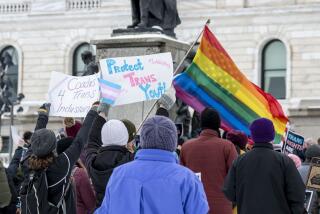There’s No Place to Hide for This Persecuted Minority
- Share via
I had no sooner thought up an acronym for myself (MASH--Male Anglo-Saxon Heterosexual) than I found out it’s already taken.
I had hoped that in screening myself behind an acronym I might obtain some of the protection that other victims of insensitivity enjoy.
Actually, on thinking it over, I had decided that MASH should stand for Male Anglo Senior Heterosexual. The word Anglo is universally used to mean not only Anglo-Saxon but any person of European stock, so nothing is lost by dropping the Saxon. And adding the word senior includes another of my vulnerabilities. But alas, too late.
“Your column,” writes Mary Alice Wanamaker of Gardena, “suggests that you consider yourself a MASH (Male Anglo-Saxon Heterosexual). You have thereby inadvertently become one of us. Welcome to our group: M*A*S*H (Members of Arthritics for Self-Help.) We have been in existence since 1985.”
Wanamaker expresses no animosity toward me for my inadvertent intrusion; in fact she invites me to speak to her group. “Almost all of us are seniors,” she says. “We do look forward to seeing the next century in. That is the beginning of the year 2001, right?”
I am so pleased that a group of seniors know when the 21st Century begins that I have agreed to talk to them, but not, of course, as a MASH.
Meanwhile there are signs that more and more males are beginning to think of themselves as a persecuted minority and demand their rights, as other minority groups do.
I have a letter from M. Paul Epstein, executive director of the Straight White Male Defense Fund. (Its acronym, unfortunately, is unpronounceable).
“I wanted you to know,” he writes, “that there is an organization that looks out for your interests. . . . Some friends and I have formed this organization because we were tired of hearing all the tirades against SWM’s from minority, feminist and homosexual groups. If we try to express our opinions about something, we’re shouted down as racist, sexist and homophobic. We will not tolerate this attitude any longer.”
While I can honestly say that I have been vilified as a male, as an Anglo, as a senior and as a heterosexual, I am not yet hard-pressed enough to join Epstein’s group.
Meanwhile, however, I am excoriated by a witch. I noted recently that the spread of sensitive groups had become so ridiculous that even witches were organizing to defend themselves against insult.
As Kay Sunstein Hymowitz noted in the New Republic, “The latest minority to join the plethora of ethnic, sexual and cultural groups now seeking the status of victimhood are, yes, witches.”
As a result of my noting this phenomenon, Marsha Smith Shaw of Laguna Niguel writes: “As a member of the ‘latest minority . . . witches . . . I would like to let you know how belittling and insulting your comments are to those who follow this earth-oriented, life-affirming path.
“Witches are real people who, through attunement to Nature and the cycles of the season, seek to understand the great spiritual mysteries of the Universe. Comments like yours . . . can influence members of the public to treat witches with disrespect or outright hostility and persecution.”
I certainly don’t want to be responsible for another Salem witch hunt. As long as witches leave me alone, I’ll leave them alone.
Shaw also scoffs at my own predicament: “As to the insensitive treatment you receive as a MASH,” she says, “there will probably be more than a few feminists (myself included) who will illustrate why that particular group has no need of protection. Rather, our entire society has been built on increasing, sustaining and maintaining the grasp of MASHs on the lives of women, children and other minorities.” See what I mean?
Meanwhile, going back to those who legitimately need protection from insensitive epithets, I quote Laura Remson Mitchell, government issues coordinator for the National Multiple Sclerosis Society, who writes to clarify the attitude of disabled persons to certain euphemisms now being promoted (such as dif-abled and differently abled ).
“You may be pleased to note,” she says, “that many disability activists frown on the euphemisms as much as you do. . . Although I object to stigmatizing and demeaning terms--especially invalid --and I strongly object to wheelchair-bound and confined to a wheelchair as inaccurate and misleading, I feel perfectly comfortable being described as a person with a disability. (I wrote to you when this issue came up several years ago that I preferred handicapped to disabled . I now prefer disabled , but I have no great objection to handicapped .
“Wheelchairs are mobility tools, not prisons,” she adds.
That leads me to suggest that a proper term for a person who uses a wheelchair is wheelchair mobile .
Let’s see if it catches on.


